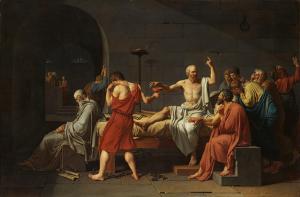
Be brave. Be prophetic, but take care.
Jeremiah loved Judah, would take nothing, certainly no gold, from Babylon, but Jeremiah predicted victory for Babylon and just punishment for Judah.
That is intellectual bravery.
There is no courage in attacking an establishment that does not pay you or that you despise. Many would rather lose their jobs than their social status. There is bravery in speaking the truth to the powerful in the group that pays your salary or whose approval you would crave.
If you love wisdom, the establishment often kills you. As a result, there is a trickster who manages not to die by going up to a line and not (quite!) crossing that line. There is a job in any society for the one who is the resident critic. A man can take on his party, his philosophical allies, as long as he does not go too far.
The sophists of ancient Athens got rich charming the elite for tuition to educate the children of the powerful. They made fun of the parents, always a good way to get cheap popularity with the children, but never went too far. You can poke at the rulers of the age as long as you do not go after their grift or pleasures. Ask Socrates.
Take on Athenian educational practices, like Socrates did, and you had to get some blowback that consists of being forced to drink hemlock. Socrates could not be controlled and so he had to go. The problem with Socrates was not being critical, since puckish criticism can be entertaining. The court fool is allowed to poke fun at the king within limits. Socrates would not draw any lines. Socrates insisted on examining everything, always, without limits.
Socrates would go to the places, intellectually, where nobody was allowed to go. As a result, Socrates had to die if he would not leave the city. Socrates would not stop questioning himself and so he could not stop questioning everyone he met. If you asked Socrates a question, he kept following reason to the end, even if the establishment grew restless.
Socrates dared monotheism in polytheistic times. Socrates pressed for virtue when pragmatism was a virtue.
Ever since Socrates’s time, a certain kind of religious “scholar” has written the “brave book” taking on exactly the targets the educational establishment loathe. This is brave only if the writer desired the approval of the religious establishment. Since the “religious establishment” has no power in the mainstream “academic establishment,” one has to determine what one wishes! If one wanted to work at Liberty U under Jerry Falwell Jr. (Heaven forfend!) then a person had one strategy, but if one wished to get a job at a typical Christian college or university, one adopted an utterly different strategy. One wrote a book attacking the “religious right,” earned a NPR interview, and went on to earn tenure from the approving, and every growing administrators at Christian colleges that hated Liberty and listened to NPR. Christian parents would keep paying usury to fund your salary.
Sadly, grifters grasped this truth and in many “educational” institutions these humbugs postured as “conservative” in order to get money, students, and donors from those people hurt or fearful of the bigger secular academic establishment. A small, new inner ring of powerful people came into existence to oppose the other, greater elite.
This is worse. If Orthodox Christianity is true, then misusing the Truth for personal peace and affluence is particularly vile. We must oppose our seeming allies if they fall into ruinous behavior as hard as we oppose ideological enemies.
We cannot live by lies. We need the truth.
Like the prophets, let us love justice and mercy. Let us speak against those doing injustice. Let’s particularly speak against those unjust powerful people whose approval we crave.
Inspired by a Junior College class on Plato’s Euthydemus.












